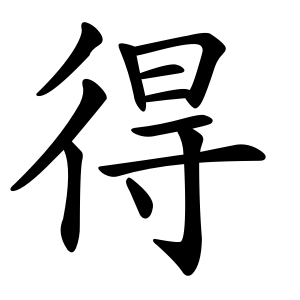得
- to obtain, to get, to gain, to acquire;
- to achieve, to be able to;
Etymology
An associative compound:
彳 (“step, action”) — semantic element, indicating movement or action.
貝 (“shell, money”) — semantic element, symbolizing valuables.
寸 (“hand, measure”) — semantic element, symbolizing the hand’s action of grasping.
Together: “to get valuables into one’s hand” → to obtain, to gain.
Oracle bone and bronze inscriptions: depict a hand grasping a shell (貝), later with 彳 added to stress action.
Shuowen Jiezi: records the 彳 + 貝 + 寸 form as the standard, and the simpler “hand + shell” as guwen (ancient form).
Stabilized in clerical script (隸書 lìshū) into the modern form.
Usage in Korean
取得 (취득) — to acquire, to obtain
獲得 (획득) — to gain, to win
得意 (득의) — to be pleased, proud of success
心得 (심득) — what one has learned; gained understanding
所得 (소득) — income, earnings
得病 (득병) — to contract a disease
不得不 (부득불) — cannot avoid, have no choice but to
Additional notes
In Classical Chinese, 得 not only meant “to obtain” but also developed into a grammatical auxiliary:
能得 (can obtain), later simplified to 得 (can).
Positive connotations (“to gain, to achieve”) made 得 a popular name character in Korea in past centuries (esp. in male names).
Example: names ending with “득” (e.g., 광득, 성득).
In modern times, such usage has declined and is considered old-fashioned.
Symbolically, 得 represents achievement, possession, realization — and by extension, success and fulfillment.
- 竹人日一戈 (HOAMI)
- ⿰ 彳 㝵
